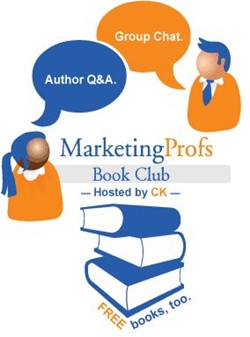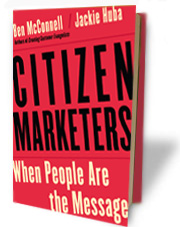 Ever read a book and wanted to discuss or debate it with fellow marketers? Now you can. Or ask the author a question? Now you can do that, too.
Ever read a book and wanted to discuss or debate it with fellow marketers? Now you can. Or ask the author a question? Now you can do that, too.
Offering a free-flow of ideas—and some free books—our Book Club keeps you ahead of the marketing curve and provides an arena to virtually meet some of the best minds in marketing... all from the comfort of your own home, or office.
It's all marketing all the time and features a wide range of topics with a lineup boasting such luminaries as Ben McConnell and Jackie Huba (see Q&A, below), Al & Laura Ries, and Paul Gillin. New releases, books that never got their due, and pre-releases, too, will be included.
Why are we organizing a book club? To give you a chance to discuss marketing principles with authors as well as share best practices across the marketing community. In fact, you'll likely find that you'll learn just as much from other marketers as you will from reading the books.
Here's how it works:
- Kickoff: Every two months a new book will be announced through an author Q&A distributed through the MarketingProfs newsletter and Daily Fix blog. The first 30 people to sign up for each segment receive a free, author-signed book—but an unlimited number of people can take part.
- Read: Members are given approximately 5-6 weeks to read each book (and to allow time for book mailings).
- Group review: Through an online review area, we'll discuss the book's themes, ask questions of the author—and each other—as well as rank the book. Group review will be announced through our newsletter and blog, and via email.
For our inaugural Book Club segment, we'll be reading Citizen Marketers the just-released, highly anticipated book by famed customer-evangelist team Ben McConnell and Jackie Huba.
 McConnell and Huba run one of the industry's most popular blogs and have been praised by BusinessWeek, the New York Times, and Forbes. Citizen Marketers is a tremendous source of knowledge both for those new to and for those already working in social media.
McConnell and Huba run one of the industry's most popular blogs and have been praised by BusinessWeek, the New York Times, and Forbes. Citizen Marketers is a tremendous source of knowledge both for those new to and for those already working in social media.
Here are the highlights of my Q&A with the book's authors:
What is the premise of Citizen Marketers?
The book documents the cultural shift under way when everyday people can be broadcasters and publishers and build a worldwide audience. As citizens of the world create content using social media (blogs, podcasts, online communities, etc.) about products, services, and companies they love (or hate), they are causing massive disruptions for traditional media and the companies that advertise with them.
We see this with big, traditional media companies like Tribune, which has put itself up for auction, and the demise earlier this year of the newspaper chain Knight-Ridder.
How is this book different from Creating Customer Evangelists, your earlier work? How does it complement your thought leadership coined by Forbes as the "word-of-mouth gospel?"
"Citizen Marketers" picks up where "Creating Customer Evangelists" left off. When CCE came out in late 2002, blogs were barely a blip on anyone's radar, podcasts had yet to be invented, and community forum software wasn't nearly ubiquitous as it is today. Because technologists have shaped our social media tools so well, the tools are beginning to shape us. As for word of mouth, researchers have just recently begun to explore its many depths; we know, now, that word of mouth is the most influential medium when it comes to buying decisions. Every day, citizens with their social media tools are quietly leeching away mass media's power when it comes to marketing for or against companies.
What is the 1% Rule, and what implications does it have for B2B and B2C marketers?
After we gathered data from nearly a dozen varying companies and organizations, we formulated the 1% rule, which stipulates that about one percent of a "democratized community" will create content for it. (Like Wikipedia, where anyone can create content for it.) A corollary is that about 10 percent of the community typically interacts with the citizen-created content by commenting, voting, or ranking. The lesson here is that a very small percentage of the community will create content, but it creates value for 100 percent of the community.
The conventional wisdom has been largely dependent on the (80/20) rule for involvement, so our research into the 1% Rule is probably a bit frightening for some Web 2.0 companies thinking they're going to be the next YouTube or MySpace.
With marketing evolving into a participatory process, what are the key action points for today's marketers who have been taught the traditional "top-down" lessons of positioning, message delivery, and brand management?
The first step is to be up-to-the-minute aware of online "word on the street" about every aspect of your brand, product, company, or organization. Those are the lightning strikes in the wilderness, which can either turn out be nothing or the starting point of a fire. Then search for the online evangelists or vigilantes—jump into their conversations. That seems to create a terrific amount of social capital, based on the idea that someone from Company X is actually listening and getting involved.
The advanced organizations bring the discussion home. They launch a blog and/or discussion area on their Web site to connect with the community and create a loyalty asset. The super-advanced organizations involve the highly motivated evangelists in the product development and marketing processes. They provide context, meaning, and (when the time is right) the word of mouth to kick-start the marketing process.
What does the book's tagline, "When People Are the Message," mean exactly?
A decade from now, cultural anthropologists will pinpoint the moment in time when the era of neatly stage-managing and controlling message management in the marketplace was largely lost. That moment in time, we believe, is right now.
In the 1960s when television was taking over the power center of communication, Marshall McLuhan famously said: "The medium is the message." That brilliant concept is still true, and will always remain true. But in an era when anyone can be a publisher or a broadcaster and influence the opinion of niches, or mass niches, of people in the marketplace, people are the new mass media.
The disruption to the traditional structures of corporate communications is nothing short of stunning.
* * *
To take part in the MarketingProfs Book Club simply email your name and address to bookclub@marketingprofs.com. While the first 30 people to sign-up for this segment will receive a free book, an unlimited number of people can take part in the book club (the hardcover edition of Citizen Marketers is only $16.50 through Amazon). Plus, with new Book Club segments/books every two months, there will be plenty of chances to receive free books throughout the New Year.
Here are some links for more information. Happy holidays... and happy reading!
Helpful links




